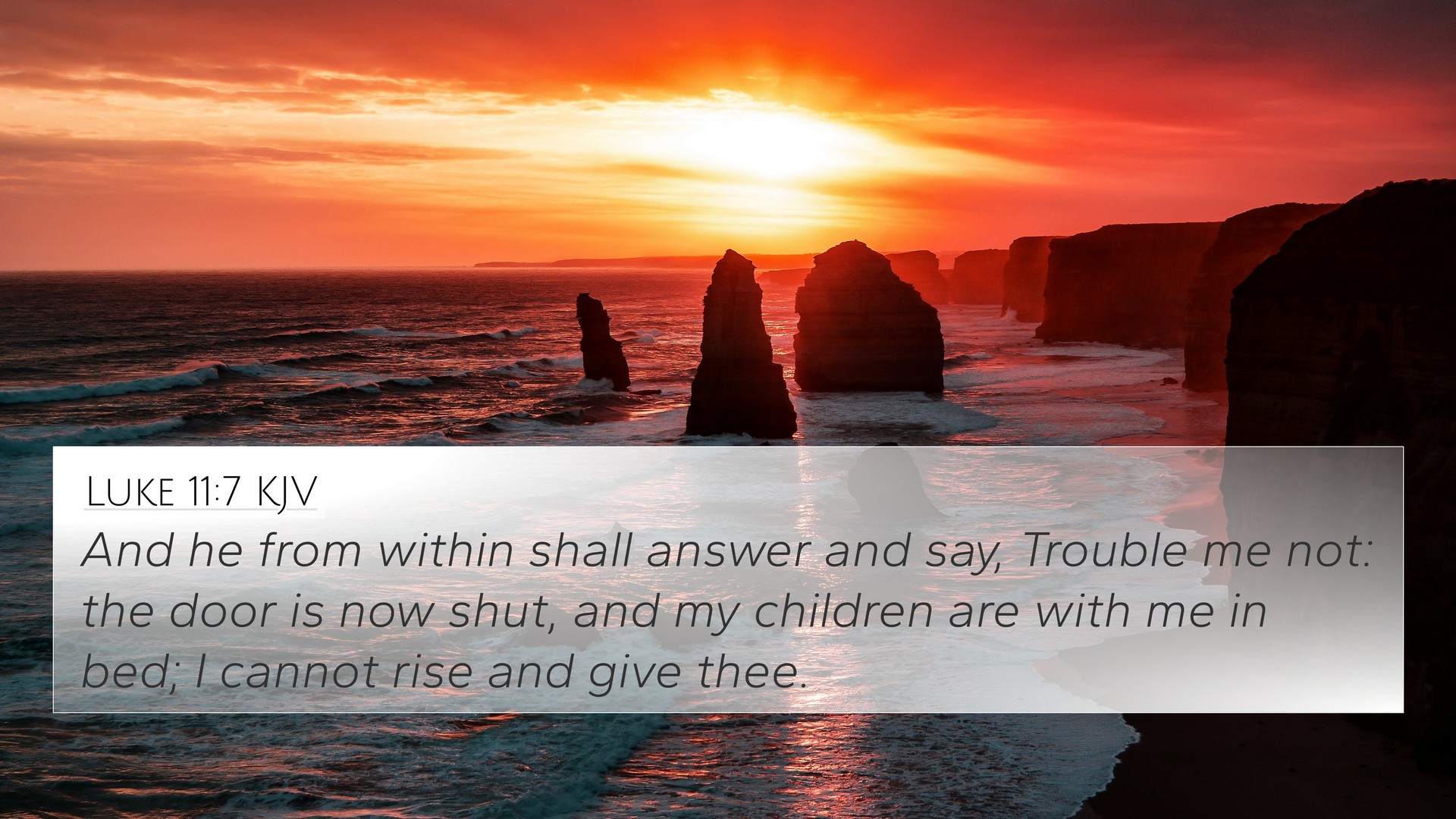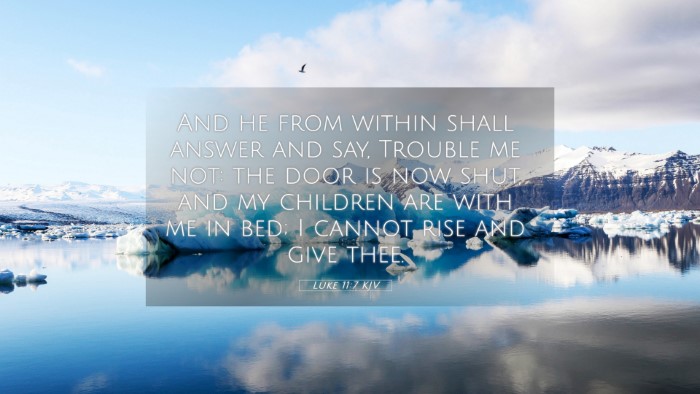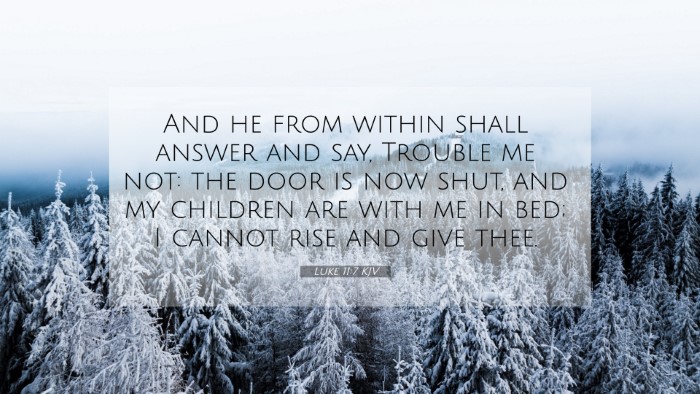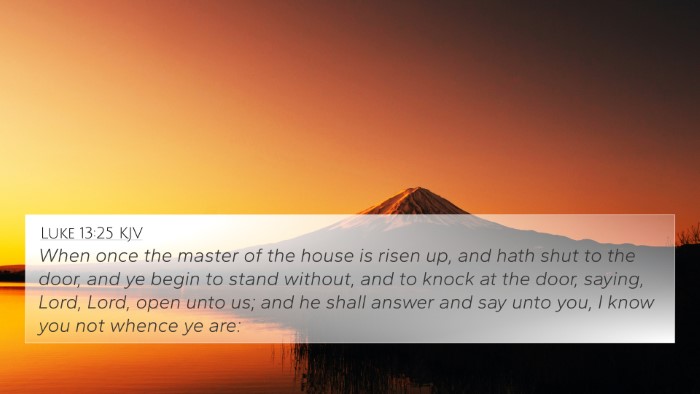Understanding Luke 11:7
Luke 11:7: "And he from within shall answer and say, Trouble me not; the door is now shut, and my children are with me in bed; I cannot rise and give thee."
Contextual Overview
In Luke 11:7, Jesus depicts a scenario to teach about prayer and persistence. The parable illustrates the reluctance of a neighbor to respond to a late-night request for help, highlighting themes of friendship, urgency, and the nature of human interactions. This verse forms part of a larger teaching on prayer, where Jesus encourages His followers to ask, seek, and knock.
Commentary Insights
Insights from public domain commentaries provide historical and theological understanding:
- Matthew Henry:
Henry emphasizes the reluctance of the neighbor as a reflection of human nature and the need for persistence in prayer. He suggests that while the neighbor is hesitant, it illustrates that God will respond more readily to our needs. This neighbor's refusal serves as a contrast, showing that if even a reluctant human responds eventually, how much more will a loving God respond to His children?
- Albert Barnes:
Barnes points out that this parable stresses the importance of perseverance in prayer. The apologetic manner of the neighbor indicates that even though he is in a position of inconvenience, he is still called upon. The essence of the teaching is that God values our persistent requests and will answer beyond our expectations.
- Adam Clarke:
Clarke interprets the verse within the cultural context of hospitality in Eastern societies. He notes that a person's response to a call for help reflects their social obligations and relationships. Thus, even though the neighbor's initial reaction is one of refusal, the expectation within the parable is that he will eventually overcome his reluctance due to the social fabric that binds community members.
Thematic Connections
This verse serves as an example to explore broader themes within scripture. Below are biblical connections that enhance understanding and illustrate thematic verse relations:
- 1. Matthew 7:7: "Ask, and it will be given to you; seek, and you will find; knock, and it will be opened to you." This passage reaffirms the call to ask persistently, mirroring the persistence in Luke 11:7.
- 2. Luke 18:1-8 (The Parable of the Unjust Judge): Another parable that emphasizes the need for persistent prayer, highlighting God's eventual justice.
- 3. James 1:5: "If any of you lacks wisdom, let him ask of God, who gives to all liberally and without reproach, and it will be given to him." This provides assurance of God’s generous response to requests.
- 4. Philippians 4:6: "Be anxious for nothing, but in everything by prayer and supplication, with thanksgiving, let your requests be made known to God." Reinforces the approach to prayer encouraged in Luke 11:7.
- 5. 1 John 5:14: "Now this is the confidence we have in Him, that if we ask anything according to His will, He hears us." Connects to the assurance that our prayers are heard.
- 6. Proverbs 3:5-6: "Trust in the Lord with all your heart, and lean not on your own understanding; in all your ways acknowledge Him." Encourages reliance on God which aligns with the themes of dependence in prayer.
- 7. Matthew 21:22: "And whatever things you ask in prayer, believing, you will receive." Affirms the necessity of faith in prayer, aligned with the concepts in Luke 11:7.
- 8. Romans 12:12: "Rejoicing in hope, patient in tribulation, continuing steadfastly in prayer." Links to the persistent nature of prayer emphasized in the parable.
- 9. Hebrews 4:16: "Let us therefore come boldly to the throne of grace, that we may obtain mercy and find grace to help in time of need." Highlights the boldness in approaching God, as suggested in this verse.
- 10. John 16:24: "Until now you have asked nothing in My name. Ask, and you will receive, that your joy may be full." This speaks to the completeness of asking God and receiving, resonating with the themes presented in Luke 11:7.
Cross-Referencing Biblical Texts
The practice of cross-referencing allows a deeper insight into the interconnected nature of scripture:
- Identifying Connections: Observing how prayer requests are portrayed across different books can reveal common themes.
- Thematic Bible Verse Connections: A thematic study through various scriptures can illuminate how prayer functions in the believer's life.
- Comparative Bible Verse Analysis: Comparing Luke 11:7 with other relevant scriptures can provide context and clarity.
- Inter-Biblical Dialogue: Engaging different verses in conversation enables a richer understanding of theological principles.
Conclusion
Luke 11:7 serves as a pivotal verse encouraging believers to engage deeply in prayer, emphasizing the themes of persistence, community, and the character of God. By exploring cross-references, one can appreciate the broader biblical narrative and its teachings on relationship with God and one another.
Tools for Bible Cross-Referencing
For those wishing to delve deeper into the connections between Bible verses, consider utilizing:
- Bible concordance
- Bible cross-reference guide
- Comprehensive Bible cross-reference materials
- Cross-reference Bible study methods
- Bible reference resources






